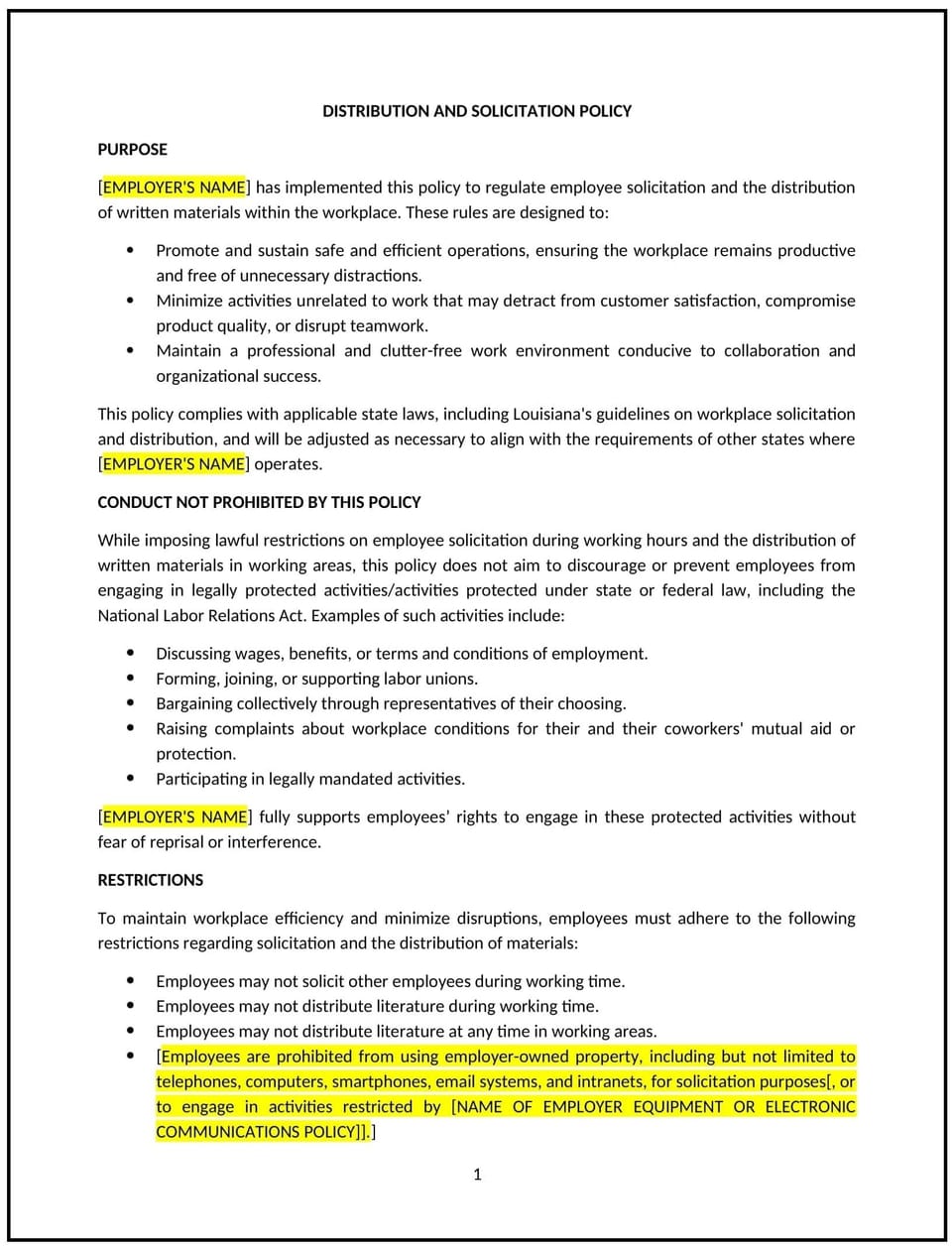Distributions and solicitation policy (Louisiana): Free template

Distributions and solicitation policy (Louisiana)
This distributions and solicitation policy is designed to help Louisiana businesses establish clear guidelines for managing solicitation and distribution activities in the workplace. It outlines acceptable practices, restrictions, and procedures to maintain a productive and distraction-free work environment.
By implementing this policy, businesses can reduce workplace disruptions, promote fairness, and provide clarity to employees and visitors.
How to use this distributions and solicitation policy (Louisiana)
- Define solicitation and distribution: Clearly describe what activities are considered solicitation (e.g., selling products, fundraising) and distribution (e.g., handing out flyers).
- Specify restricted areas: Identify locations where solicitation or distribution is prohibited, such as workstations, meeting rooms, or other operational areas.
- Set permitted times: Define when solicitation or distribution may occur, such as during break times or outside of working hours.
- Establish approval processes: Provide a procedure for requesting approval for solicitation or distribution activities, if applicable.
- Address third-party activities: Clarify rules for external vendors or visitors soliciting or distributing materials on company premises.
- Communicate disciplinary measures: Outline consequences for violating the policy to ensure adherence.
Benefits of using a distributions and solicitation policy (Louisiana)
Implementing this policy provides several advantages for Louisiana businesses:
- Reduces workplace disruptions: Maintains focus and productivity by managing solicitation activities effectively.
- Promotes fairness: Establishes consistent rules for all employees and third parties.
- Protects operational efficiency: Minimizes interruptions to critical business functions.
- Provides clarity: Helps employees and visitors understand acceptable practices for solicitation and distribution.
- Reflects Louisiana-specific practices: Aligns with local cultural and workplace norms for managing such activities.
Tips for using this distributions and solicitation policy (Louisiana)
- Clearly communicate the policy: Ensure employees and visitors understand the rules and their purpose.
- Train managers: Equip supervisors with tools to address solicitation issues or questions appropriately.
- Monitor activities: Regularly assess workplace activities to identify and address unauthorized solicitation or distribution.
- Foster open communication: Provide employees with a way to seek clarification or request exceptions to the policy.
- Review regularly: Update the policy to reflect changes in workplace needs or Louisiana-specific considerations.
Q: What activities are considered solicitation under this policy?
A: Solicitation includes activities such as selling products, collecting donations, promoting external services, or distributing promotional materials in the workplace.
Q: Are employees allowed to distribute materials at work?
A: Distribution of materials may be allowed in designated areas or during non-working hours, as specified in the policy.
Q: How should businesses handle third-party solicitation?
A: Businesses should restrict third-party solicitation to approved activities and ensure that visitors follow the same rules as employees.
Q: Can employees solicit for charitable causes?
A: Charitable solicitations may be allowed if approved by management and conducted in line with the policy’s guidelines.
Q: What should businesses do if the policy is violated?
A: Violations should be addressed promptly, with disciplinary actions based on the severity of the infraction and outlined in the policy.
Q: How often should this policy be reviewed?
A: The policy should be reviewed annually or when significant changes occur in workplace practices or Louisiana regulations.
Q: How can businesses handle exceptions to the policy?
A: Exceptions may be considered on a case-by-case basis and require prior approval from management or HR.
This article contains general legal information and does not contain legal advice. Cobrief is not a law firm or a substitute for an attorney or law firm. The law is complex and changes often. For legal advice, please ask a lawyer.


